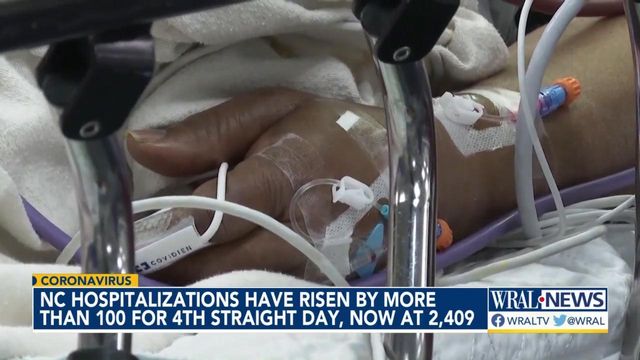Federal data shows Raleigh, Durham ICUs close to capacity
On Thursday, 2,409 people were being treated for COVID-19 in hospitals across North Carolina, and 5,900 new cases were reported.
Posted — UpdatedWakeMed, Duke Health Raleigh, Rex, Duke Regional and Duke University and University of North Carolina hospitals report capacity directly to the DHHS. Four of the six show 95 percent or more of ICU beds occupied in the past week.
Rex and UNC hospitals reported 80 or more percent of ICU beds occupied.
"It's always a pretty high stress thing to try and see as many people as possible, and trying to find beds for everybody," said Dr. Matthew St. Marie, a senior resident at UNC Health.
The real difference is the number of people coming in, who don't have COVID who are here for other things is dramtically higher now," he added.
The data includes all people in the ICU, regardless of the cause, and shows that capacity is being pushed to the limit at a time when COVID-19 cases are on the rise.
On Thursday, 2,409 people were being treated for COVID-19 in hospitals across North Carolina, and 5,900 new cases were reported.
The number of people hospitalized for the virus has tripled in just three weeks.
Both Duke University Hospital and Duke Health Raleigh Hospital reported no available ICU beds.
Duke University Hospital Chief Medical Officer Lisa Picket said this limits their ability to take patients from other hospitals and puts a strain on resources and staff.
"Here's another big mountain to climb over and so, they're really exhausted and frustrated that, here comes another wave and we haven't had time to heal ourselves," said Pickett.
Pickett said she's worried it may not be the worst of it.
"This Delta variant is terrible, and we don't know how much worse the next variant could be," said Pickett.
"It does seem like this Delta variant is tending to hit people faster and harder and at a younger age," said St. Marie.
WakeMed, with the highest number of COVID-19 patients (60) had just three ICU beds available.
Dr. Eric Eskioglu, chief medical and scientific officer at Novant Health, said health system is on track to match or exceed the surge of COVID-19 cases they saw in their hospitals in January.
"Unfortunately, we have more than a 1,000% increase in COVID-19 hospital admissions today compared to just three weeks ago,” he said. “The average age of hospitalized COVID-19 patients is also 44, down from 61 in January. More than 90% of patients hospitalized with COVID are unvaccinated, and they are sicker than the patients we saw during earlier surges. Entire families are presenting in our emergency rooms for COVID testing. This surge is still preventable. I urge and plead with everyone to get vaccinated now."
While cases are climbing quickly, the vaccination rate is increasing only slowly. A little over 60% of adults in North Carolina has had at least one vaccine dose and 58% are fully vaccinated.
"I have not admitted [and] I don't know any of my colleagues who have admitted any patient who hasCOVID who has been vaccinated," said Pickett.
Related Topics
• Credits
Copyright 2024 by New York Times News Service and WRAL.com. All rights reserved. This material may not be published, broadcast, rewritten or redistributed.






